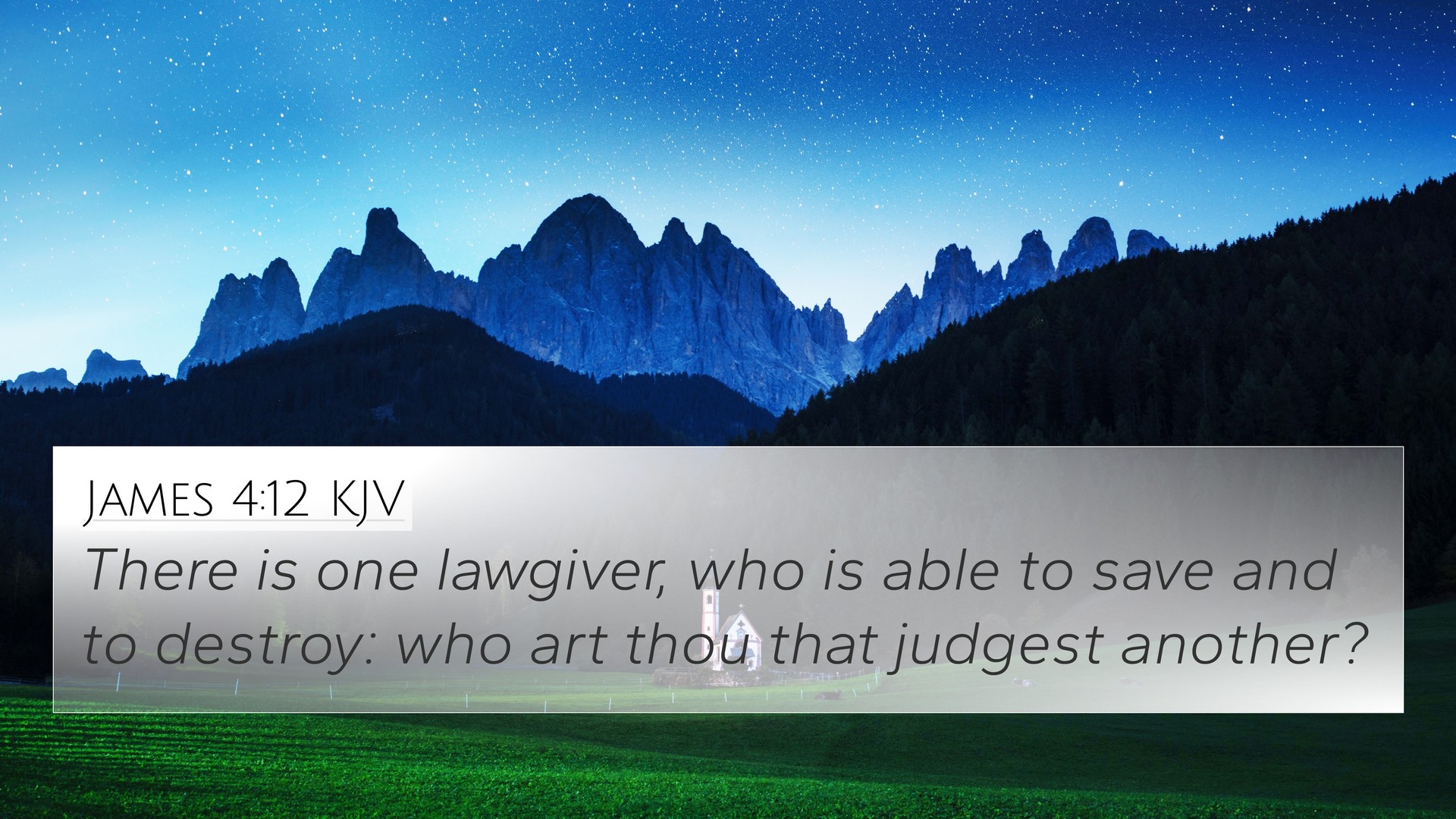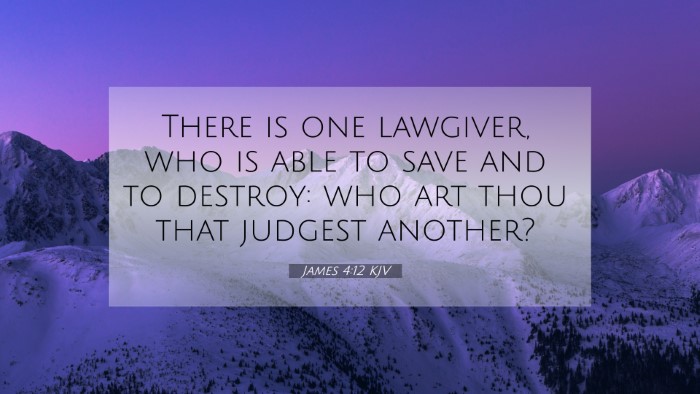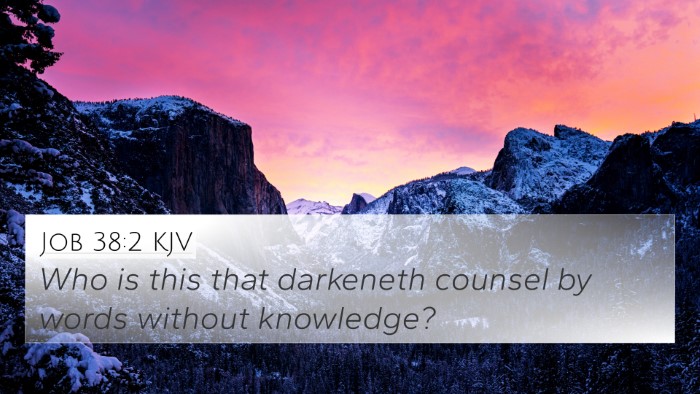Old Testament
Genesis Exodus Leviticus Numbers Deuteronomy Joshua Judges Ruth 1 Samuel 2 Samuel 1 Kings 2 Kings 1 Chronicles 2 Chronicles Ezra Nehemiah Esther Job Psalms Proverbs Ecclesiastes Song of Solomon Isaiah Jeremiah Lamentations Ezekiel Daniel Hosea Joel Amos Obadiah Jonah Micah Nahum Habakkuk Zephaniah Haggai Zechariah MalachiJames 4:12 Similar Verses
James 4:12 Cross References
There is one lawgiver, who is able to save and to destroy: who art thou that judgest another?
Uncover the Rich Themes and Topics of This Bible Verse
Listed below are the Bible themes associated with James 4:12. We invite you to explore each theme to gain deeper insights into the Scriptures.
James 4:12 Cross Reference Verses
This section features a detailed cross-reference designed to enrich your understanding of the Scriptures. Below, you will find carefully selected verses that echo the themes and teachings related to James 4:12 KJV. Click on any image to explore detailed analyses of related Bible verses and uncover deeper theological insights.
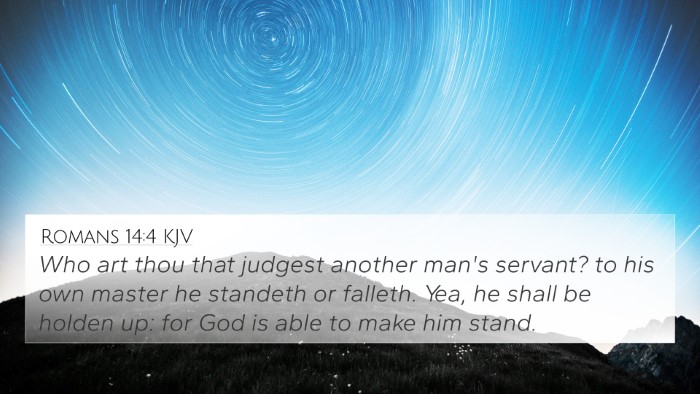
Romans 14:4 (KJV) »
Who art thou that judgest another man's servant? to his own master he standeth or falleth. Yea, he shall be holden up: for God is able to make him stand.
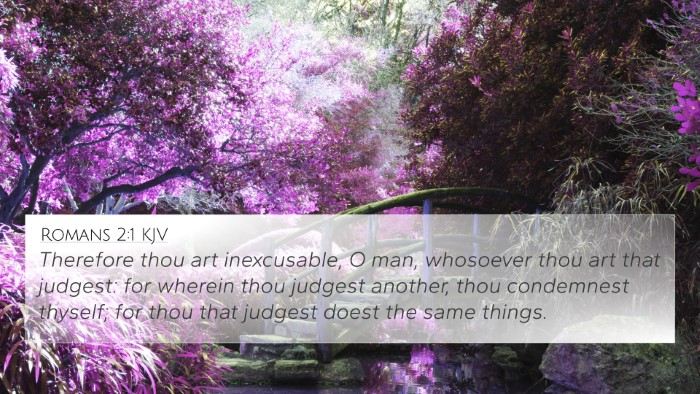
Romans 2:1 (KJV) »
Therefore thou art inexcusable, O man, whosoever thou art that judgest: for wherein thou judgest another, thou condemnest thyself; for thou that judgest doest the same things.

Matthew 10:28 (KJV) »
And fear not them which kill the body, but are not able to kill the soul: but rather fear him which is able to destroy both soul and body in hell.
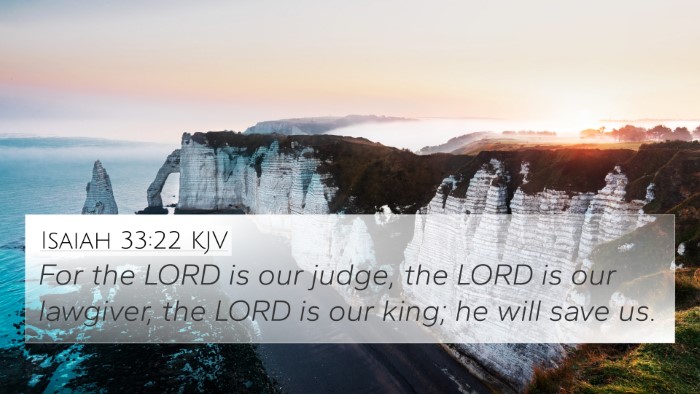
Isaiah 33:22 (KJV) »
For the LORD is our judge, the LORD is our lawgiver, the LORD is our king; he will save us.
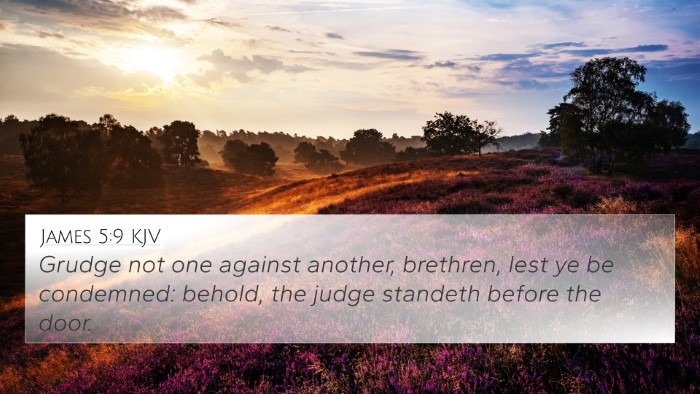
James 5:9 (KJV) »
Grudge not one against another, brethren, lest ye be condemned: behold, the judge standeth before the door.
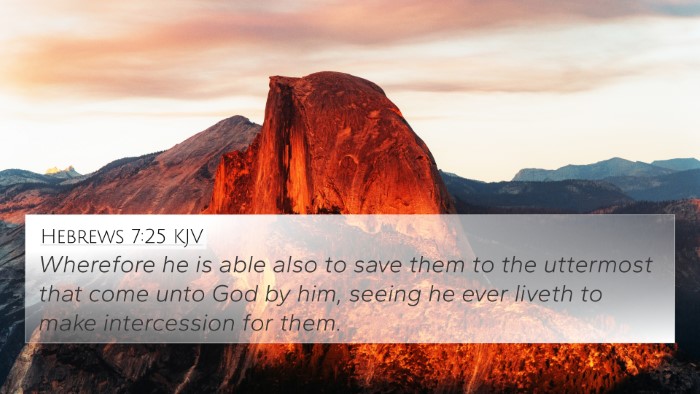
Hebrews 7:25 (KJV) »
Wherefore he is able also to save them to the uttermost that come unto God by him, seeing he ever liveth to make intercession for them.
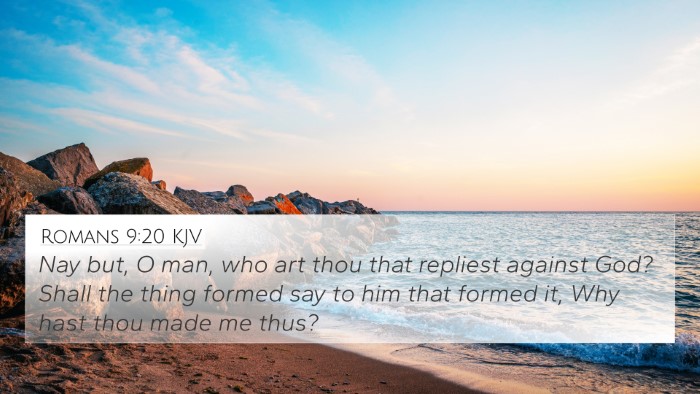
Romans 9:20 (KJV) »
Nay but, O man, who art thou that repliest against God? Shall the thing formed say to him that formed it, Why hast thou made me thus?
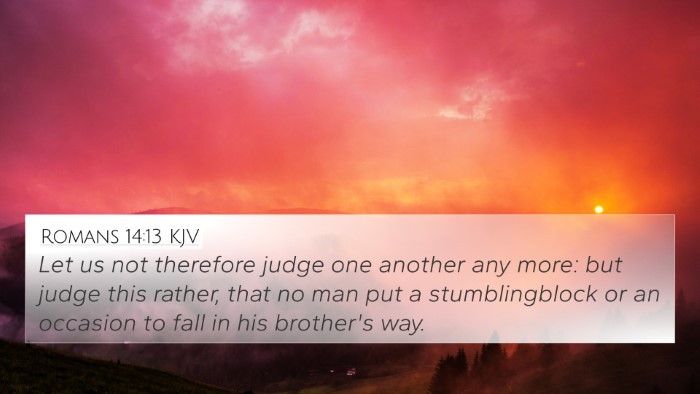
Romans 14:13 (KJV) »
Let us not therefore judge one another any more: but judge this rather, that no man put a stumblingblock or an occasion to fall in his brother's way.

Luke 12:5 (KJV) »
But I will forewarn you whom ye shall fear: Fear him, which after he hath killed hath power to cast into hell; yea, I say unto you, Fear him.

1 Samuel 25:10 (KJV) »
And Nabal answered David's servants, and said, Who is David? and who is the son of Jesse? there be many servants now a days that break away every man from his master.
James 4:12 Verse Analysis and Similar Verses
Understanding James 4:12
James 4:12: "There is one lawgiver, who is able to save and to destroy: who art thou that judgest another?"
This verse serves as a profound reminder of God’s sovereign authority as the ultimate judge. The scripture states that there is only one lawgiver who possesses the power to grant salvation or condemnation, emphasizing the limited role of humans in judging others.
Summary of Insights
Matthew Henry’s Commentary
Matthew Henry highlights the dangerous inclination of humans to judge one another, pointing out that when we assume the role of judge, we overlook our own imperfections. He emphasizes the necessity of leaving judgment to God, who has the authority and wisdom to judge righteously.
Albert Barnes’ Commentary
Albert Barnes underscores the uniqueness of God as the lawgiver. He argues that since God is the one who establishes the law and has the absolute right to enforce it, human judgment often falls short of divine standards. This invites believers to exercise humility and refrain from condemning others.
Adam Clarke’s Commentary
Adam Clarke interprets this verse as a caution against presumption and hypocrisy. He posits that the act of judging others is often rooted in self-righteousness, which blinds individuals to their own faults. Clarke exhorts readers to recognize their own need for grace before casting judgment on others.
Key Themes
- Divine Authority: Recognition of God as the ultimate lawgiver and judge.
- Human Fallibility: Acknowledging our limitations in moral judgment.
- Humility: The call for humility in our relationships with others.
Cross-References
This verse correlates with several other passages throughout the Bible that discuss themes of judgment and the authority of God.
- Matthew 7:1-2: "Judge not, that ye be not judged." This reinforces the principle to refrain from judgment to avoid being judged.
- Romans 14:10: "But why dost thou judge thy brother? or why dost thou set at nought thy brother?" Encouraging self-reflection over judgment of others.
- 1 Corinthians 4:5: "Therefore judge nothing before the time, until the Lord come." A reminder to await God’s ultimate judgment.
- Galatians 6:1: "Brethren, if a man be overtaken in a fault, ye which are spiritual, restore such an one." Highlighting the restoration process rather than condemnation.
- Matthew 12:36: "But I say unto you, That every idle word that men shall speak, they shall give account thereof in the day of judgment." Emphasizing accountability before God.
- Job 34:29: "When he [God] holdeth his peace, who can condemn?" Stressing that God’s silence does not mean His absence or approval of wrongdoing.
- Luke 6:37: "Judge not, and ye shall not be judged: condemn not, and ye shall not be condemned." Similar teaching on avoiding judgment.
- James 2:13: "For he shall have judgment without mercy, that hath showed no mercy." An urgent reminder of the mercy we ought to show others.
Thematic Connections
James 4:12 can be placed within a broader context of biblical teachings that address the relationships between individuals and the moral and ethical responsibilities we hold. The theme of humility in the face of others' faults is echoed in various scriptures.
Practical Reflections for Believers
For believers seeking to live out the truths of James 4:12, it's vital to:
- Embrace a posture of humility and self-examination.
- Focus on grace and mercy in their interactions.
- Engage in scriptural study to understand God's word and how it applies to human behavior.
Conclusion
In summary, James 4:12 serves as a powerful exhortation for believers to relinquish judgment of others and to recognize God’s sovereign position as the ultimate authority. This verse is intrinsically linked to many other Bible verses that discuss themes of judgment, humility, mercy, and divine authority, all of which can guide a believer’s relationship with God and others.
